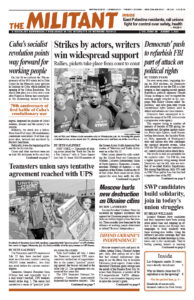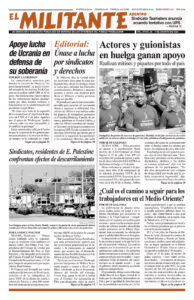Russian President Vladimir Putin has escalated his regime’s murderous war against the Ukrainian people with air attacks on civilian targets across the country. These assaults have been met by the defiance of working people determined to defend Ukraine’s independence.
Moscow targeted ports and grain facilities, hitting Odesa, Ukraine’s largest port, daily, after pulling out of a deal that had allowed international shipping to use the Black Sea to facilitate Ukrainian cereal exports. Drone strikes destroyed Ukrainian grain storage near the mouth of the Danube River July 24, across from Romania, a member of the U.S.-imperialist-led NATO alliance. The river is an alternative shipping route to move the country’s grain.
The air attacks killed or wounded a number of civilians and ruined the historic Ukrainian Orthodox cathedral in central Odesa. In the northwest Black Sea the Russian navy conducted a live-fire exercise July 21, threatening to target ships from any country sailing to Ukrainian ports.
In one strike, over 60,000 tons of grain was destroyed in an Odesa warehouse. Some 36 million tons of Ukrainian corn, wheat and other foods were shipped in the past year, more than half to drought-affected countries, like Ethiopia, Kenya and Somalia.
With cereal shortages causing prices to rise, Russian grain exporters stand to benefit. More Ukrainian grain will now have to be shipped overland through Europe. To cover the increased costs, Arif Husain, chief economist at the World Food Program, demanded a cut to the price paid to Ukrainian farmers.
Pro-war ultranationalist arrested
Since the war began Putin has stepped up assaults on his political opponents, including the jailing of anti-war protesters. Now he is also clamping down on rightist opponents.
One of those, Igor Girkin, was arrested in Moscow July 21 for “inciting extremism,” based on comments he made about Putin. He faces five years in jail. Members of Girkin’s group, the Angry Patriots Club, protested outside his court hearing. Three of them were detained.
Like Putin, Girkin is an ex-FSB secret police officer. Under the nom de guerre of Igor Strelkov he was a leader of Moscow’s forces that seized Crimea in 2014 and led the takeover of Donetsk, in eastern Ukraine, by pro-Moscow separatists the same year. He was later convicted by a court in the Netherlands of the shooting down of Malaysian Airlines Flight 17 over eastern Ukraine in 2014, killing all 298 aboard.
Girkin calls Putin a “cowardly mediocrity” and blames him for Moscow’s failure to defeat Kyiv. He also calls for the incorporation of Armenia, Belarus, Georgia and Ukraine into the Russian Federation. He warns that forces inside Russia “are preparing a pro-Western coup” to “dismember the Russian Federation.” All force necessary must be used to defeat them, he says, urging an even more draconian course at home than that carried out by Putin.
On top of Girkin’s threats and Putin’s repression, working people in Russia bear the brunt of the capitalist economic and social crisis, exacerbated by U.S.-led sanctions.
The ruble has fallen by 18% against the dollar this year, pushing up import costs and prices for working people. While its military spending soars, the Kremlin plans to cut its overall budget by 10%.
As many as a quarter million Russian workers and farmers in uniform have been killed, wounded, defected or gone missing since the invasion began, according to the U.K. defense ministry. Russia’s military courts are convicting deserters at the rate of over 100 per week. But many deserters receive suspended sentences so that officials can send them back to the front. In the Zaporizhzhia region, some complete platoons have voluntarily surrendered to Ukrainian forces.
Their morale contrasts sharply with that of workers and youth in Ukraine.
“Everyone understands that now we have to defend our land from the Russian invasion,” Anastasiya Vaganova, who runs the music venue Caribbean Club in Kyiv, told the Financial Times. Members of the well-known Ukrainian rock band Antytila no longer perform because they enlisted as medics at the front. Music promoter Yougin Kibets says, “I can’t do heavy rock music now, because all of the audience for live rock music have joined the army, it’s like their credo.”

